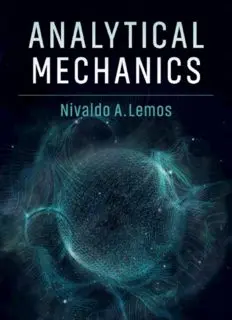
Analytical mechanics PDF
Preview Analytical mechanics
AnalyticalMechanics Analytical mechanics is the foundation of many areas of theoretical physics, including quantumtheoryandstatisticalmechanics,andhaswide-rangingapplicationsinengineer- ing and celestial mechanics. This introduction to the basic principles and methods of analytical mechanics covers Lagrangian and Hamiltonian dynamics, rigid bodies, small oscillations, canonical transformations and Hamilton-Jacobi theory. This fully up-to-date textbookincludesdetailedmathematicalappendicesandaddressesanumberofadvanced topics, some of them of a geometric or topological character. These include Bertrand’s theorem,proofthatactionisleast,spontaneoussymmetrybreakdown,constrainedHamil- tonian systems, non-integrability criteria, KAM theory, classical field theory, Lyapunov functions,geometricphasesandPoissonmanifolds.Providingworkedexamples,end-of- chapterproblemsanddiscussionofongoingresearchinthefield,itissuitableforadvanced undergraduatestudentsandgraduatestudentsstudyinganalyticalmechanics. NivaldoA.LemosisAssociateProfessorofPhysicsatFederalFluminenseUniversity,Brazil. HewaspreviouslyavisitingscholarattheMassachusettsInstituteofTechnology.Hismain researchareasarequantumcosmology,quantumfieldtheoryandtheteachingofclassical mechanics. Analytical Mechanics NIVALDO A. LEMOS FluminenseFederalUniversity UniversityPrintingHouse,CambridgeCB28BS,UnitedKingdom OneLibertyPlaza,20thFloor,NewYork,NY10006,USA 477WilliamstownRoad,PortMelbourne,VIC3207,Australia 314–321,3rdFloor,Plot3,SplendorForum,JasolaDistrictCentre,NewDelhi–110025,India 79AnsonRoad,#06–04/06,Singapore079906 CambridgeUniversityPressispartoftheUniversityofCambridge. ItfurtherstheUniversity’smissionbydisseminatingknowledgeinthepursuitof education,learning,andresearchatthehighestinternationallevelsofexcellence. www.cambridge.org Informationonthistitle:www.cambridge.org/9781108416580 DOI:10.1017/9781108241489 ©2004,EditoraLivrariadaF´ısica,Sa˜oPaulo Englishtranslation©CambridgeUniversityPress2018 RevisedandenlargedtranslationofMecaˆnicaAnal´ıticaby NivaldoA.Lemosoriginallypublishedin PortuguesebyEditoraLivrariadaF´ısica,Sa˜oPaulo2004 Thispublicationisincopyright.Subjecttostatutoryexception andtotheprovisionsofrelevantcollectivelicensingagreements, noreproductionofanypartmaytakeplacewithoutthewritten permissionofCambridgeUniversityPress. Englisheditionfirstpublished2018 PrintedintheUnitedKingdombyTJInternationalLtd.PadstowCornwall AcataloguerecordforthispublicationisavailablefromtheBritishLibrary. LibraryofCongressCataloging-in-PublicationData Names:Lemos,NivaldoA.,1952–author. Title:Analyticalmechanics/NivaldoA.Lemos,FluminenseFederalUniversity. Othertitles:Mecaˆnicaanal´ıtica.English Description:Cambridge,UnitedKingdom;NewYork,NY:Cambridge UniversityPress,2018.|Includesbibliographicalreferencesandindex. Identifiers:LCCN2018011108|ISBN9781108416580(hb)|ISBN1108416586(hb) Subjects:LCSH:Mechanics,Analytic. Classification:LCCQA805.L43132018|DDC531.01/515–dc23 LCrecordavailableathttps://lccn.loc.gov/2018011108 ISBN978-1-108-41658-0Hardback CambridgeUniversityPresshasnoresponsibilityforthepersistenceoraccuracy ofURLsforexternalorthird-partyinternetwebsitesreferredtointhispublication anddoesnotguaranteethatanycontentonsuchwebsitesis,orwillremain, accurateorappropriate. Tomywife Marcia andmydaughters Cintia,LuizaandBeatriz Contents Preface pagexi 1 LagrangianDynamics 1 1.1 PrinciplesofNewtonianMechanics 1 1.2 Constraints 7 1.3 VirtualDisplacementsandd’Alembert’sPrinciple 11 1.4 GeneralisedCoordinatesandLagrange’sEquations 17 1.5 ApplicationsofLagrange’sEquations 24 1.6 GeneralisedPotentialsandDissipationFunction 28 1.7 CentralForcesandBertrand’sTheorem 31 Problems 37 2 Hamilton’sVariationalPrinciple 42 2.1 RudimentsoftheCalculusofVariations 42 2.2 VariationalNotation 49 2.3 Hamilton’sPrincipleandLagrange’sEquations 50 2.4 Hamilton’sPrincipleintheNon-HolonomicCase 56 2.5 SymmetryPropertiesandConservationLaws 65 2.6 ConservationofEnergy 71 2.7 Noether’sTheorem 73 Problems 78 3 KinematicsofRotationalMotion 86 3.1 OrthogonalTransformations 86 3.2 PossibleDisplacementsofaRigidBody 92 3.3 EulerAngles 95 3.4 InfinitesimalRotationsandAngularVelocity 96 3.5 RotationGroupandInfinitesimalGenerators 102 3.6 DynamicsinNon-InertialReferenceFrames 103 Problems 109 4 DynamicsofRigidBodies 112 4.1 AngularMomentumandInertiaTensor 112 4.2 MathematicalInterlude:TensorsandDyadics 114 4.3 MomentsandProductsofInertia 119 vii viii Contents 4.4 KineticEnergyandParallelAxisTheorem 120 4.5 DiagonalisationoftheInertiaTensor 122 4.6 SymmetriesandPrincipalAxesofInertia 126 4.7 RollingCoin 129 4.8 Euler’sEquationsandFreeRotation 131 4.9 SymmetricTopwithOnePointFixed 139 Problems 145 5 SmallOscillations 149 5.1 One-DimensionalCase 149 5.2 AnomalousCase:QuarticOscillator 154 5.3 StationaryMotionandSmallOscillations 161 5.4 SmallOscillations:GeneralCase 163 5.5 NormalModesofVibration 165 5.6 NormalCoordinates 170 5.7 MathematicalSupplement 176 Problems 178 6 RelativisticMechanics 183 6.1 LorentzTransformations 183 6.2 LightConeandCausality 188 6.3 VectorsandTensors 191 6.4 TensorFields 194 6.5 PhysicalLawsinCovariantForm 196 6.6 RelativisticDynamics 199 6.7 RelativisticCollisions 204 6.8 RelativisticDynamicsinLagrangianForm 207 6.9 ActionataDistanceinSpecialRelativity 209 Problems 211 7 HamiltonianDynamics 215 7.1 Hamilton’sCanonicalEquations 215 7.2 SymmetriesandConservationLaws 220 7.3 TheVirialTheorem 221 7.4 RelativisticHamiltonianFormulation 224 7.5 Hamilton’sEquationsinVariationalForm 226 7.6 TimeasaCanonicalVariable 228 7.7 ThePrincipleofMaupertuis 234 Problems 237 8 CanonicalTransformations 242 8.1 CanonicalTransformationsandGeneratingFunctions 242 8.2 CanonicityandLagrangeBrackets 248 ix Contents 8.3 SymplecticNotation 250 8.4 PoissonBrackets 254 8.5 InfinitesimalCanonicalTransformations 258 8.6 AngularMomentumPoissonBrackets 262 8.7 LieSeriesandFiniteCanonicalTransformations 264 8.8 TheoremsofLiouvilleandPoincare´ 268 8.9 ConstrainedHamiltonianSystems 272 Problems 281 9 TheHamilton-JacobiTheory 288 9.1 TheHamilton-JacobiEquation 288 9.2 One-DimensionalExamples 291 9.3 SeparationofVariables 294 9.4 IncompletenessoftheTheory:PointChargeinDipoleField 299 9.5 ActionasaFunctionoftheCoordinates 303 9.6 Action-AngleVariables 306 9.7 IntegrableSystems:TheLiouville-ArnoldTheorem 312 9.8 Non-integrabilityCriteria 316 9.9 Integrability,Chaos,DeterminismandErgodicity 318 9.10 PreludetotheKAMTheorem 320 9.11 ActionVariablesintheKeplerProblem 323 9.12 AdiabaticInvariants 325 9.13 Hamilton-JacobiTheoryandQuantumMechanics 329 Problems 332 10 HamiltonianPerturbationTheory 338 10.1 StatementoftheProblem 338 10.2 GeneratingFunctionMethod 341 10.3 OneDegreeofFreedom 342 10.4 SeveralDegreesofFreedom 345 10.5 TheKolmogorov-Arnold-MoserTheory 348 10.6 Stability:EternalorLongTerm 353 10.7 LieSeriesMethod 354 Problems 358 11 ClassicalFieldTheory 360 11.1 LagrangianFieldTheory 360 11.2 RelativisticFieldTheories 365 11.3 FunctionalDerivatives 367 11.4 HamiltonianFieldTheory 371 11.5 SymmetriesoftheActionandNoether’sTheorem 374 11.6 SolitaryWavesandSolitons 378 11.7 ConstrainedFields 381 Problems 385
